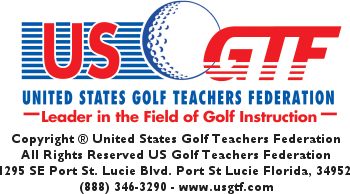WHAT THEY SAY… WHAT THEY MEAN
Golfers everywhere seem to have a common set of swing “reasons” why they hit the shot they just hit. The USGTF Technical Committee came up with a list of six phrases you can hear at just about any course across the country on any given day. These phrases deal with swing sensations and not the actual happening, such as “I hit it fat.” Of course, these golfers are telling us what they are feeling, but the root causes often are something entirely different. Here’s the list, and what they really mean when they utter these phrases:
“I swung too quick.”
A common belief is that swinging too quickly is a bad thing, especially during the backswing. In fact, touring professionals on average actually swing more quickly than amateur golfers during the backswing. When someone says they swung too quick, chances are they swung more quickly than they normally do. Usually it starts with the takeaway, where the club is snatched back. Making sure the start of the swing is smooth while swinging with their normal tempo is the key for all golfers.
“I came over it.”
Golfers say this when they hit a pull-draw or a pull-hook. Usually it’s better players who say this, because since they normally don’t come over the top, they can feel it when they do…or think they do. They may not be coming over the top in the traditional sense, and visually it may not be detectable when they make this move, but it can definitely be felt. All it takes is for the hands to be a fraction of an inch too far outside where they normally are when starting the downswing for a good player to feel this sensation. Fully completing the backswing as they usually do should take care of this problem for most golfers.
“I didn’t clear my hips.”
This is a cousin of “I came over it,” because not clearing the hips can cause coming over the top. However, they can be two different things. This sensation, again usually felt by a better player, occurs when the player’s lower body doesn’t clear as it normally does. The result is normally a pull, pull-draw or pull-hook, or a draw or hook that started towards the target.
“I got ahead of the ball.”
When someone hits a push, push-fade or a push-slice, you are likely to hear this phrase. Generally it happens when someone doesn’t completely finish the backswing and they move laterally too early with their upper body during transition.
“I came off the ball.”
When someone said this while playing with Ben Hogan, Hogan supposedly famously remarked, “What the heck does that mean, ‘coming off the ball?’” What the player is saying is that he didn’t stay down through impact with the entire body. This can be the result of not being committed to the shot because the player is worried about the result.
“I looked up.”
Let’s do some math. There are almost 16,000 golf courses in the United States. They might average 90-100 golfers per day, so let’s call that 1.5 million golfers per day. It’s almost a sure-fire bet that perhaps one-third of these players will utter the phrase “I looked up” at some point during their round, meaning it will be said around a halfmillion times per day! This is the most common phrase you will hear, and you hear it not only when the player topped the ball or hit it thin, but also when they hit it fat. You will also hear friends tell other friends,“You looked up,” after a poor shot. These players don’t really look up, nor do they lift their heads. What happened
was they failed to keep their levels at some point during the swing, either by unhinging at the hips or unflexing the knees. In the case of someone hitting it fat who believes they looked up, most likely they lost their balance and leaned back through impact, resulting in the lead shoulder raising prematurely and bringing the head with it.
Summary
What players felt and what they actually did might be two different things. Perception does not always equal reality, as golf teaching professionals throughout history have learned. What the player is feeling is often the result of a faulty move rather than the actual cause itself. Well-trained teaching professionals know the difference, making them a valuable asset in the golf industry.




